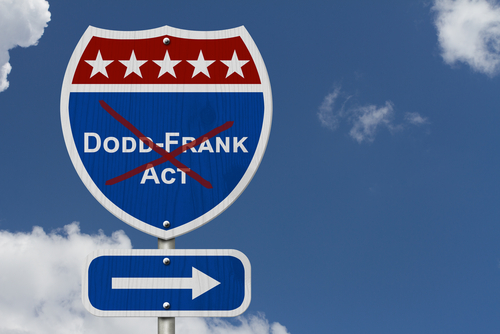The House Financial Services Committee passed the Financial Choice Act on Thursday, a Republican-led initiative to rollback or change many of the reforms implemented in the Dodd-Frank Act.

It was approved in the committee 34-26 along party lines. It now moves to the full House for a vote.
Among the key changes, the Financial Choice Act would allow banks to opt out of Dodd-Frank upon holding enough cash and limits federal stress tests of major banks to every two years. It also removes the power of the government to label a bank “too big to fail,” and replaces Dodd-Frank’s Orderly Liquidation Authority with a bankruptcy process. In addition, it would repeal the Durbin Amendment, also known as the swipe fee reform, which put a cap on charges stores pay banks when a customer uses the card.
Further, it changes the Consumer Financial Protection Bureau (CFPB) to the Consumer Law Enforcement Agency. The bill limits the agency’s power and mandates that its director is removable at will by the president. Its budget would be controlled by Congress.
Several banking associations cheered the committee’s approval.
“We are encouraged by Chairman (Jeb) Hensarling’s commitment to meaningful and targeted changes to Dodd-Frank, and welcome many of the Financial Choice Act’s provisions which provide regulatory relief for both banks and consumers, such as the repeal of the Durbin Amendment. With almost no debate prior to passage, the Durbin Amendment imposed price controls on debit interchange fees while promising lower prices for consumers — but the savings never came,” Consumer Bankers Association President and CEO Richard Hunt said.
The CBA says it believes consumers would be best served by a five-person, bipartisan commission for the CFPB as opposed to a director.
“In order to achieve long-term economic stability and sustain consumer confidence, the CFPB must be governed by a diverse group of policymakers and industry experts who understand the every-day needs of American families and small businesses,” Hunt said.
The Independent Community Bankers of America also voiced its support.
“This ICBA-supported legislation includes many provisions in ICBA’s pro-growth Plan for Prosperity regulatory relief platform, such as common-sense reforms to burdensome and costly mortgage-lending requirements, relief from excessive and unnecessary call report and data-collection mandates, and a repeal of Durbin Amendment price controls on debit card interchange,” ICBA President and CEO Camden Fine said.
Also, the American Bankers Association backed the committee’s passage of the act.
“The thousands of pages of new regulations facing banks have become a tremendous driver of decisions to sell or merge. Given the cost of complying with all the new rules, some community banks are having to choose between meeting those regulatory requirements and meeting the financial needs of their individual and business customers,” ABA President and CEO Rob Nichols said.
“The Financial Choice Act addresses many of these concerns. We’re pleased that it includes many provisions that ABA has long advocated, including a repeal of the Durbin interchange amendment; the TAILOR Act, which requires that regulations be tailored to fit an institution’s business model and risk profile; the Qualified Mortgage safe harbor provision for mortgages held in a lender’s portfolio; and other measures that would allow banks to better serve their customers and communities,” Nichols added.